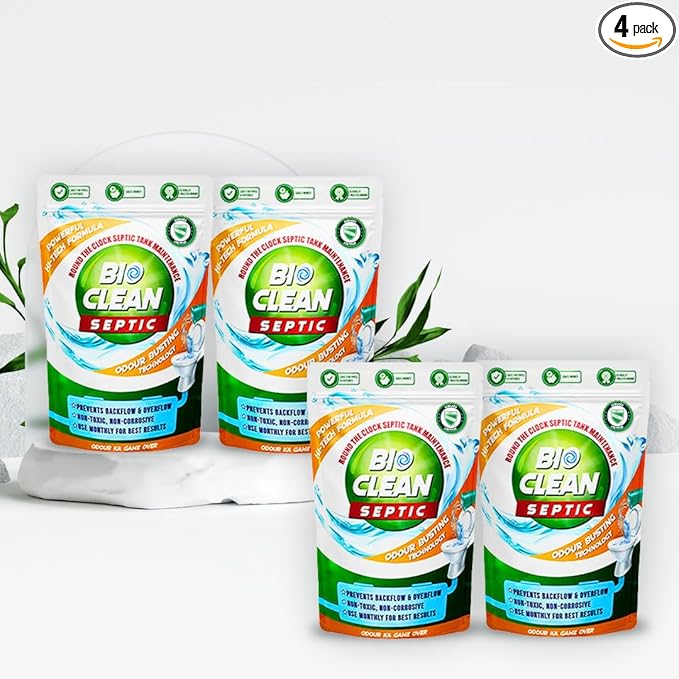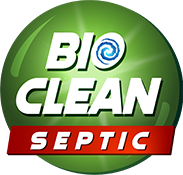What Are Septic Tank Cleaners and How Do They Work?

If you’ve been dealing with foul smells, slow drains, or a tank that hasn’t been pumped in years, you’re probably wondering if there’s a way to fix things without digging up your yard. That’s where septic tank cleaner come in.
But selecting one isn't as easy as picking the strongest product. How a cleaner operates, whether it is beneficial or breaks your tank can impact how well your system lasts. This article examines what is found in these cleaners, how they function, and when using them really makes sense.
What Are Septic Tank Cleaners?
A septic tank cleaner is a solution that assists your tank with disposing of the waste that accumulates within it. With each time you flush a toilet or drain water from your shower or sink, that wastewater enters your septic tank. Solid trash eventually settles to the bottom, forming a dense film of solid sludge. If that sludge is not degraded or eliminated, it will clog the tank and destroy the system.
Septic tank cleaners are designed to assist with controlling that buildup. Some cleaners accomplish this by dissolving the solids with bacteria or enzymes. Others employ harsh chemical compounds. But the intention is the same to minimize the amount of waste that remains within the tank, so your system continues working correctly without backing up or being odorous.
These cleaners don’t replace the need to pump out the tank every few years, but they do help in keeping the tank balanced and functional between cleanouts.
Different types of septic tank cleaners
Not all septic cleaners work the same way. Some dissolve waste by force, others break it down biologically. Here’s how the two main types compare.
Chemical Cleaners
Strong acids, alkalis, or other man-made chemicals are used to prepare chemical cleaners. Their task is to remove the waste as fast as they can. They accomplish this by chemically transforming the solid materials in the tank so they dissolve or disintegrate.
For instance, sodium hydroxide (which many cleaners utilize) increases the pH level higher than 12, which liquefies fats and proteins within minutes. It may assist in clearing clogs or breaking down grease. But the catch is:
That same pH kills the beneficial bacteria within your tank that are out the solid waste to begin with.
A septic tank will usually rely on anaerobic bacteria to degrade more than half of the solids that enter. If you break that process, it's not going to work the way it was intended. You might not notice it at first but after a while the tank becomes full more rapidly, stinks more, and backs up more frequently.
Chemical cleaners also carry risk beyond the tank. If they leak or overflow, they can corrode pipes, damage drain fields, or pollute nearby groundwater.
Enzymatic/Bio-Based Cleaners
Enzymatic or bio-based cleaners have another method of working. Rather than tearing things apart with force, they assist in the natural digestion of the tank. Similar to the bacteria in your tank, these cleansers include live microbes and enzymes that break down trash.
Suppose your tank gets 200–250 litres of wastewater per individual each day. About 60% of that has organic material such as fats, proteins, and carbohydrates. Bio-cleaners accelerate the degradation of those materials utilizing particular enzymes:
- Lipase for oil and fat
- Protease for proteins
- Amylase for starches
These enzymes break down large particles into smaller ones. Then, the bacteria digest what’s left.
This process takes longer than chemical cleaning. But it doesn’t disturb the tank’s natural environment. In fact, it strengthens it. Studies show that regular use of bio-cleaners can reduce sludge buildup, cut odour, and lower the risk of system failure, without damaging soil or groundwater.
When Should You Use Septic Tank Cleaners?
Septic cleaners are not meant for daily use, they work best when coordinated with critical signs, behaviors, or system disruptions. This is when they really help.
1. If You Haven’t Pumped in 2–3 Years
Septic tanks usually need to be pumped every three to five years, depending on the size of the house. But in India, most tanks don’t follow this schedule.
If it is over two years and your tank has never been cleaned, applying a bio-based cleaner can minimize odour, soften organic solids, and relieve pressure until the next pump-out. Just remember, it's not a replacement, but an assist.
2. When You Start Noticing Odour or Slow Drains
Early indicators of bacterial imbalance in your tank are:
- Bad odours around the toilet or in the yard
- Gurgling drains
- Slow-flushing toilets
This typically indicates the solids are not breaking down. At this point, utilizing a bacterial cleaner reestablishes microbial function before the tank becomes overloaded.
3. After Using Bleach or Antibacterial Products
Even a single cycle of strong cleaning chemicals can disrupt the septic system. Chemicals such as bleach or disinfectants kill bacteria by 70%–90% within the tank.
If this occurs, a dose of live bacteria and enzymes replenishes the natural population which is responsible for breaking down your waste.
4. After Pumping Your Tank
Immediately after a tank is drained, it has no bacterial foundation remaining. Introducing a bio-cleaner during the first week will get the digestion process started again in a hurry and prevent buildup from beginning too soon anew.
5. In High-Use Periods
If you have guests staying over or your water usage spikes (e.g., holidays), your tank receives more organic load than usual. Adding a bio-cleaner during or after these high-use periods can help the system keep up.
Choose the Right Septic Tank Cleaner for Your Home
At this point, you may be thinking: Do I go with a chemical cleaner or an enzyme-based one? The choice matters, because it affects not just how your septic tank performs today, but how long it lasts.
If you have a septic tank in your home, the more sensible choice is enzyme-based cleaners. Here's why
- They nurture, rather than support, disturb your tank's natural bacterial system.
- They digest organic waste slowly, without harming parts.
- They don’t harm soil, drain fields, or nearby water.
- They’re safe to use monthly, even if your tank is newly pumped.
- They help prevent blockages and odour when used consistently.
If you’re looking for one to start with, Bioclean Septic Tank Powder is a tested, bacteria-rich solution made for Indian households. It contains strains selected specifically to digest fats, proteins, and organic waste found in home septic systems.
For a standard 5,000-litre tank, one 250g dose per month is recommended for regular upkeep. It does it with no chemicals. No foaming agents, no bleach, and no toxic runoff. Just a healthy method of keeping your septic tank in balance, month after month.
FAQs
1. What Are Septic Tank Cleaners?
Septic tank cleaners are specialized products designed to help maintain and improve the performance of your septic system. They work by breaking down and digesting waste, preventing sludge buildup, clogs, and unpleasant odors. These cleaners can either use biological bacteria to promote natural waste breakdown or chemical agents to break down waste quickly. The type of cleaner you choose impacts your system’s health and the environment.
2. How Do Biological Septic Tank Cleaners Work?
Biological septic tank cleaners contain natural bacteria and enzymes that help digest organic waste, such as food particles, grease, and toilet paper. These bacteria break down solids into liquid or gas, which is then safely filtered through the soil. By regularly introducing these beneficial bacteria into your septic system, biological cleaners help prevent sludge accumulation, clogs, and odors while supporting the tank's long-term health.
3. How Do Chemical Septic Tank Cleaners Work?
Chemical septic tank cleaners typically contain harsh chemicals like bleach or solvents designed to break down waste quickly. They dissolve solids in the tank, but they can also kill beneficial bacteria, which are essential for the natural waste processing in your septic system. While chemical cleaners can provide immediate results, they can negatively impact your septic tank's long-term function if used frequently.
4. What Are the Benefits of Using Biological Cleaners Over Chemical Cleaners?
Biological septic tank cleaners are generally preferred over chemical cleaners because they are more eco-friendly and sustainable. Biological treatments support the natural bacteria in your tank, helping to maintain a balanced system. They also reduce the risk of environmental damage, as they do not release harmful chemicals into the soil and water. On the other hand, chemical cleaners can harm beneficial bacteria and require frequent use, potentially causing long-term issues with your septic system.
5. How Often Should I Use Septic Tank Cleaners?
The frequency of using septic tank cleaners depends on factors like the size of your tank, household usage, and whether you’re using a biological or chemical cleaner. For biological cleaners, it’s typically recommended to apply them every 3-6 months to maintain a healthy bacterial balance. Chemical cleaners should be used sparingly and only when necessary to avoid damaging the system. Regular maintenance, such as pumping the tank every 3-5 years, is also crucial for keeping your septic system in optimal condition.




